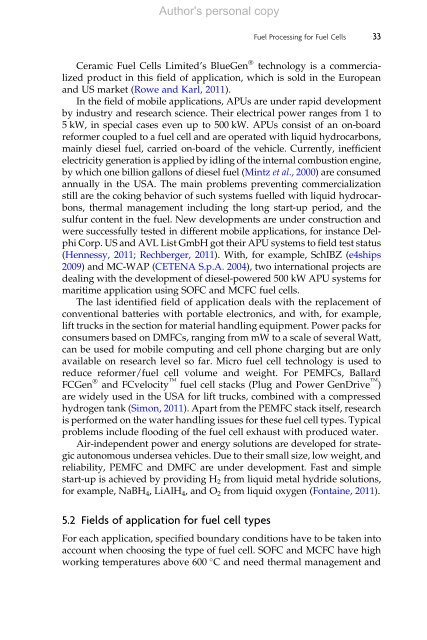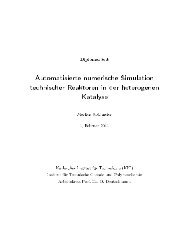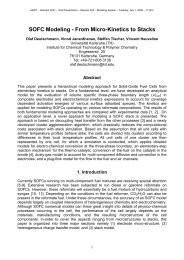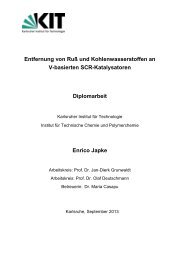Fuel Processing for Fuel Cells - Institut für Technische Chemie und ...
Fuel Processing for Fuel Cells - Institut für Technische Chemie und ...
Fuel Processing for Fuel Cells - Institut für Technische Chemie und ...
Create successful ePaper yourself
Turn your PDF publications into a flip-book with our unique Google optimized e-Paper software.
Author's personal copy<br />
<strong>Fuel</strong> <strong>Processing</strong> <strong>for</strong> <strong>Fuel</strong> <strong>Cells</strong> 33<br />
Ceramic <strong>Fuel</strong> <strong>Cells</strong> Limited’s BlueGen Ò technology is a commercialized<br />
product in this field of application, which is sold in the European<br />
and US market (Rowe and Karl, 2011).<br />
In the field of mobile applications, APUs are <strong>und</strong>er rapid development<br />
by industry and research science. Their electrical power ranges from 1 to<br />
5 kW, in special cases even up to 500 kW. APUs consist of an on-board<br />
re<strong>for</strong>mer coupled to a fuel cell and are operated with liquid hydrocarbons,<br />
mainly diesel fuel, carried on-board of the vehicle. Currently, inefficient<br />
electricity generation is applied by idling of the internal combustion engine,<br />
by which one billion gallons of diesel fuel (Mintz et al., 2000) are consumed<br />
annually in the USA. The main problems preventing commercialization<br />
still are the coking behavior of such systems fuelled with liquid hydrocarbons,<br />
thermal management including the long start-up period, and the<br />
sulfur content in the fuel. New developments are <strong>und</strong>er construction and<br />
were successfully tested in different mobile applications, <strong>for</strong> instance Delphi<br />
Corp. US and AVL List GmbH got their APU systems to field test status<br />
(Hennessy, 2011; Rechberger, 2011). With, <strong>for</strong> example, SchIBZ (e4ships<br />
2009) and MC-WAP (CETENA S.p.A. 2004), two international projects are<br />
dealing with the development of diesel-powered 500 kW APU systems <strong>for</strong><br />
maritime application using SOFC and MCFC fuel cells.<br />
The last identified field of application deals with the replacement of<br />
conventional batteries with portable electronics, and with, <strong>for</strong> example,<br />
lift trucks in the section <strong>for</strong> material handling equipment. Power packs <strong>for</strong><br />
consumers based on DMFCs, ranging from mW to a scale of several Watt,<br />
can be used <strong>for</strong> mobile computing and cell phone charging but are only<br />
available on research level so far. Micro fuel cell technology is used to<br />
reduce re<strong>for</strong>mer/fuel cell volume and weight. For PEMFCs, Ballard<br />
FCGen Ò and FCvelocity TM fuel cell stacks (Plug and Power GenDrive TM )<br />
are widely used in the USA <strong>for</strong> lift trucks, combined with a compressed<br />
hydrogen tank (Simon, 2011). Apart from the PEMFC stack itself, research<br />
is per<strong>for</strong>med on the water handling issues <strong>for</strong> these fuel cell types. Typical<br />
problems include flooding of the fuel cell exhaust with produced water.<br />
Air-independent power and energy solutions are developed <strong>for</strong> strategic<br />
autonomous <strong>und</strong>ersea vehicles. Due to their small size, low weight, and<br />
reliability, PEMFC and DMFC are <strong>und</strong>er development. Fast and simple<br />
start-up is achieved by providing H 2 from liquid metal hydride solutions,<br />
<strong>for</strong> example, NaBH 4 ,LiAlH 4 ,andO 2 from liquid oxygen (Fontaine, 2011).<br />
5.2 Fields of application <strong>for</strong> fuel cell types<br />
For each application, specified bo<strong>und</strong>ary conditions have to be taken into<br />
account when choosing the type of fuel cell. SOFC and MCFC have high<br />
working temperatures above 600 C and need thermal management and
















